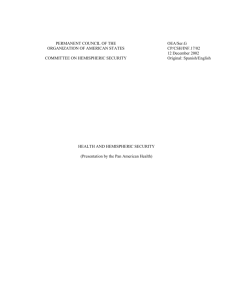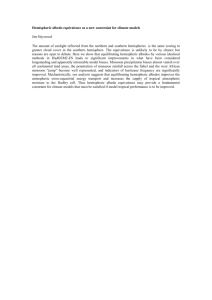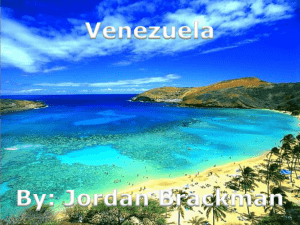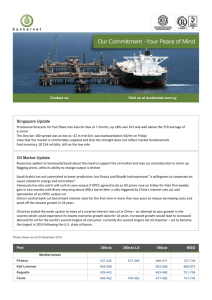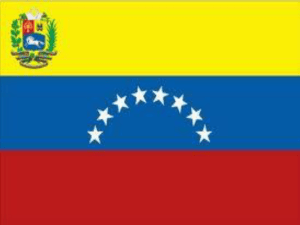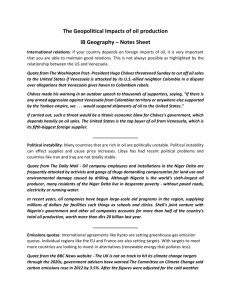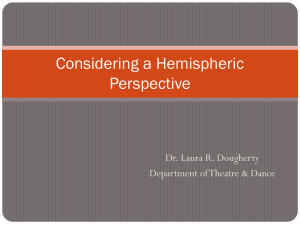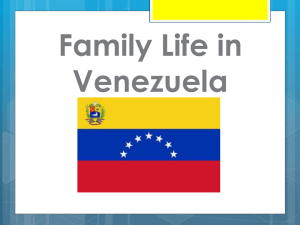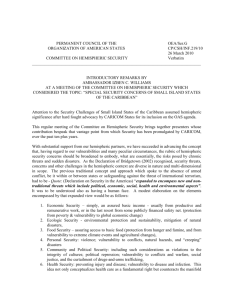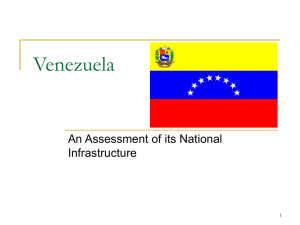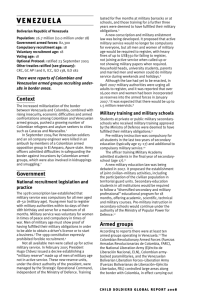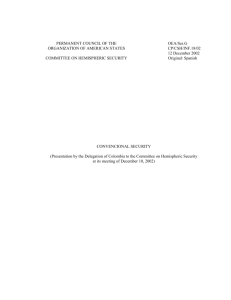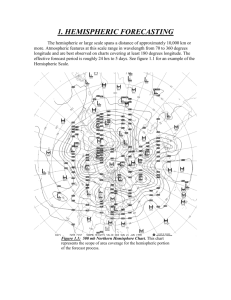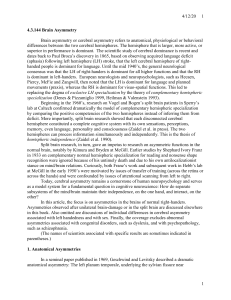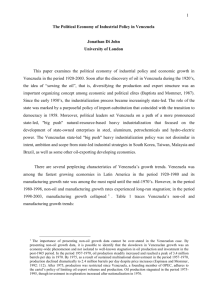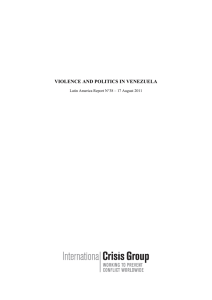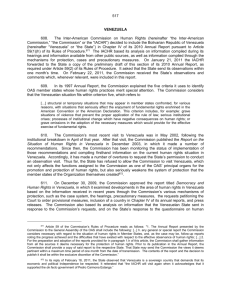intervención del embajador felipe a
advertisement
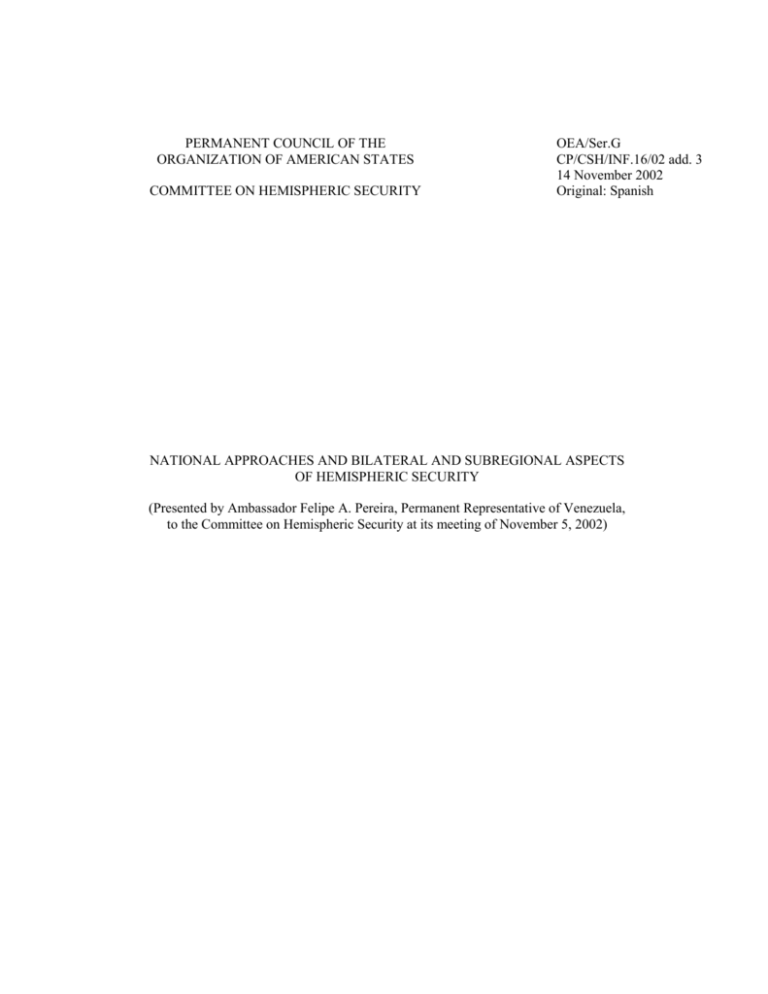
PERMANENT COUNCIL OF THE ORGANIZATION OF AMERICAN STATES COMMITTEE ON HEMISPHERIC SECURITY OEA/Ser.G CP/CSH/INF.16/02 add. 3 14 November 2002 Original: Spanish NATIONAL APPROACHES AND BILATERAL AND SUBREGIONAL ASPECTS OF HEMISPHERIC SECURITY (Presented by Ambassador Felipe A. Pereira, Permanent Representative of Venezuela, to the Committee on Hemispheric Security at its meeting of November 5, 2002) NATIONAL APPROACHES AND BILATERAL AND SUBREGIONAL ASPECTS OF HEMISPHERIC SECURITY Presented by Ambassador Felipe A. Pereira, Permanent Representative of Venezuela, to the Committee on Hemispheric Security at its meeting of November 5, 2002) Thank you, Mr. Committee Chair. To contribute to your valuable initiative of organizing an exchange of information within this Committee on national and subregional approaches to hemispheric security, I should like to make a few comments to give a broad idea of Venezuela’s position on this issue. The profound changes in the international system in the 1990s did not fail to impact this part of the Hemisphere as well. The parameters that made it possible to establish a regional security framework based on ideological notions stemming from the competition between capitalism and communism are now a thing of the past. The euphoria of the first post-Cold War years was dispelled by the emergence of new risks and challenges, the topics on a novel international agenda that are now grounds for particular concern for the majority of states. We are talking about drug trafficking, terrorism, organized crime, damage to the environment and natural disasters, exacerbated nationalism, racism, xenophobia, refugees, poverty, AIDS, corruption, arms trafficking, violations of human rights. This process of reflection on regional security must start from the premise that the traditional concept of security, based on purely military notions, is now obsolete and inappropriate. Nowadays, security is envisaged from a multidisciplinary or integral perspective, encompassing economic, social, cultural, technological, and political aspects. Add to that the particular nature of the conflicts that have arisen within states, for a number of reasons, in addition to the conflicts that have traditionally pitted one state against another. However, the absence of armed conflict between states cannot be construed today as the consolidation of lasting peace in the region so long as injustice, iniquity, structural violence, and poverty subsist in our countries. With this new broad perception of security and conflicts, it is more important than ever to redefine and adopt security mechanisms adapting the changes that have come about to the particular features of the region and to the part that the region can expect to play on the international stage. On security matters, Venezuela’s position is, on the one hand, informed by factors that are intrinsically linked to the pacifist approach it has maintained since it became a Republic, during which time it has not been involved in any international armed conflict, and, as a result, has armed forces that are conceived and equipped to defend the nation and to contribute to and participate in national development. Thus, the 1999 Constitution defines Venezuelan territory as a peace zone. Likewise, our Constitution clearly establishes that the state alone is responsible for the defense of the nation. It conceives of the National Armed Forces as an institution responsible for guaranteeing the independence and sovereignty of the Nation in the whole of its geographical territory. Based on its history and the principles upon which it was founded, Venezuela does not have large scale attack capabilities, nor does it intend to acquire them, which is why it is especially important to defend the principles of international law embedded in the Constitution, such as independence, equality among states, self-determination and noninterference in domestic matters, peaceful settlement of disputes, -2- cooperation, observance of human rights, and solidarity among peoples fighting for their emancipation and human welfare. Venezuela knows that human security is crucial for the Hemisphere and for the world. The Constitution establishes that the essential purposes of the state are the defense and development of the individual and respect for his or her dignity, the democratic exercise of the will of the people, the forging of a just and peace-loving society, the pursuit of prosperity, and the welfare of the people. That is why Venezuela knows that human security means the security of human beings, the individual, the environment, which, if it is to be organized, means living in society, a society governed by a state, which has to guarantee its citizens certain rights and freedoms, under a government chosen freely, without imposition, a government that satisfies the needs of its people with respect to health, education, housing, and justice, to name just the most basic rights, and also protects them from potential threats. The proposed security arrangements must not be ambivalent, disproportionate, or disparate. They must be standard, take into consideration the special features of the region, fill the void left by the lack of a security system, and afford their adherents a real sense of security. The way these arrangements are conceived would be closely tied in with political, military, social, economic, and environmental dimensions. CP10490E04
